Maw: Sophie's Choice (Rattle)
Introduction
William Styron's 1979 novel has had a turbulent existence, winning prizes as well as being banned, in addition to its almost inevitable transformation into a screenplay only a couple of years later (leading to Meryl Streep's Academy Award as Best Actress) and the slightly more surprising appearance as Nicholas Maw's huge opera of 2001/2.
Maw's orginal intention of writing the libretto himself was carried through, and he managed to fit in a lot of the original text, although not altogether successfully.
The story follows the book's direction almost exactly, except several fairly major sub-plots / explanations of character development and raison d'être are not revealed leaving a rather more 'bare bones' edition which still manages to fill out three and a half hours.
As in the novel, the character of Stingo is the 'narrator' and here he is played by two singers, one being the elder version looking back upon his life and experiences of Sophie and Nathan.
The year is 1947. Sophie Zawistowska is a Polish-Catholic woman who has survived being interned in Auschwitz and is now working in New York as a secretary. She is in a highly turbulent relationship with Nathan Landau, a paranoid schizophrenic who works in a pharmaceutical factory, and is Jewish.
Into the mix walks Stingo, an aspiring writer hailing from the deep South and he is immediately attracted to Sophie, and, in a different way, to Nathan, who, in between his horrifically violent moments, delivers high praise towards Stingo's writing.
Nathan also picks up on Stingo's Southern upbringing, often accusing him of being the type who took part in lynchings, comparing him and his fellow 'Dixielanders' to the Nazis. Ironically, it is Sophie, one of the most aryan of aryans, who suffered first-hand in this respect. Sophie's descriptions of her previous life are often mixed up however, yet Stingo takes it all in, falling deeply in love with her as he listens. She tells of her life in Krakow, and how she copied pamphlets for her father, who was a virulent anti-semite himself, yet who was shot by the Germans when they invaded her country.
She tells of Wanda, the partisan activist who wants to protect as many children as she can by sending them on the Lebensborn programme, in which blond, German-looking children would be taken to the homeland and be brought up as 'proper' Germans. Sophie refuses to take Wanda up on her offer.
They are both soon arrested for varying degrees of criminal acts, and find themselves being transported to Auschwitz, where we are told Eva, Sophie's 8 year old daughter, dies soon after.
Sophie is given the role of stenographer to the camp Commandant, and tries her best to get released, even pretending that she's a viruent anti-Semite by waving one of her father's leaflets under his nose. He doesn't believe it though, but admits that if he could have his way she would make him a lot happier. She gives in to him, in the hope that her son will be able to become one of the 'Lebensborn' children and at least be saved.
Sophie and Stingo have become very close, and following one of Nathan's more vitriolic and violent rants decide to escape to Virginia. On the journey, when they spend the night together, Sophie lets Stingo know about her greatest and most shameful secret, which understandably horrifies him, but only for the reasons that he now fully understands Sophie's experiences and feelings of guilt and hatred toward herself.
She leaves him a note before running back to Nathan. When Stingo catches up with her, Sophie and her lover have killed themselves.
Audio & Visual
All very fine indeed, with the DTS sound almost blowing up the speakers in some places. The diction of the singers is exemplary, but there are times when the musical lines become so complex that subtitles are a necessity (notably the fight in the cocktail bar).
The sets are quite drab, but when there are bright colours they stand out confidentally and Mark Henderson's lighting is captured impressively.
Extras
On the disc we have a 5 minute 'interview' with Simon Rattle, which is actually a collection of soundbites on his opinions of the opera ("an instant classic" apparently) but which don't really add up to much of a re-watchable item.
More interesting are the articles in the booklet which consist of a short essay on Styron's novel and a transcribed interview with the composer.
On the whole then, a rather disappointing set of extras for what I would consider a fairly major release.
Conclusion
If you haven't read the book and/or seen the film, then I think Maw's attempt at recreating the story will leave more of an impression on you. If you have then you may be disappointed.
It's not that his attempt at creating a libretto from the novel is particularly bad, but there is so much in the story that is vital to Styron's orginal premise which is left out, leaving things far too 'episodic'. Stingo's almost overwhelming sexual desire which permeates much of the novel is pushed aside (and it's pretty graphic stuff), with it all turned into a rather lurid, melodramatic TV drama where even the flashbacks to the concentration camp don't have the power they should.
Much of the 'blame' for the flaws in the work has to be put squarely on the composer's shoulders. His music is never without invention, yet it is often without development. There are huge, beautifully moving passages, and quite, reflective solos dotted throughout, yet it's as if we've heard it all before. What comes across is a smothering amalgam of almost every 20th century style of music that has gone before (bar the out-and-out bleakness of pure serialism).
Snatches of Britten and Copland are stuck in between large swathes of Berg-like melodic and harmonic exercises. There are moments which sound as if we're about to be immersed into some 1940's Hollywood movie, followed immediately by some meandering ideas that don't appear to be connected to anything that we hear before or after.
Most annoyingly is Maw's insistance of telling us how we should be feeling at 'important' places in the libretto. When 'Auschwitz' and 'Extermination!' are mentioned for example, then there is little or no accompaniment, but the words are followed by 'creepy' chords as if to say 'now you can feel horrified!'. I would hope opera audiences, even those who were new to the genre attracted by all the publicity this production generated just over 7 years ago, would be more intelligent than that, and the less said about the music during the scenes on the 'cattle trucks' the better.
But, having said all that, there are some incredibly beautiful and affecting sections of music, most notably when the libretto quotes the poetry so prevalent in the original story, no more so than at the end, when Stingo picks up the book of Emily Dickinson from Sophie's dead hand and reads the poem 'Ample make this bed'. Following this are words and musc which you have waited a long time to hear, when the older Stingo asks "At Auschwitz, tell me, 'Where was God?' The response: 'Where was man?'". Here, Maw allows us to imagine the horror and salvation of the last three and a half hours without dictating our emotions, and it's almost worth the wait.
There is absolutely nothing to complain about with the performances.
Rattle conducts the work as if he really does believe, albeit a little misguidedly, that this is one of the best British operas of the last few decades and the orchestral playing is phenomenal throughout.
On stage, the singing and acting is fantastic, with Angelika Kirchschlager making the role her own. Not being a first-language English speaker, her accent is suitably 'Polish' and yet her diction is superb (as is everyone's). She even manages to make a lot of sense of Maw's sometimes quite jagged musical lines, and in fact, all the main characters actually make much of the stilted dialogue come to life, which is somttimes a difficult thing to do when lifted almost verbatim from the page.
Maw has unfortunately left out a lot of the depth these people deserve, and so Nathan Landau is a very 'black and white' paranoid schizophrenic, yet even with this yoke, Rod Gilfrey is capable of being wonderfully menacing and gushingly romantic within moments.
The 'central' character of Stingo is, as I mentioned, sung by two people. The younger, Gordon Gietz, sings with a great Southern twang, exuding the innocence he would like to get rid of as soon as possible, and has a fine, lightish, tenor voice. The elder ('The Narrator') Stingo is performed by the baritone Dale Duesing (so Stingo's voice has obviously broken over the years) and it is he who is on stage for the longest, or so it seems. His character has to go through the emotions of every other character on stage, and this can sometimes lead to a bit of hamming-up, but this is Peter Hall's fault. Duesing's voice is strong and lasts the considerable distance, leaving the final statement to create the almost unbearable emotional punch you have been waiting for (bar Kirchsclager's animal-like scream after sacrificing her daughter to the gas chambers).
Since this first production, the opera has travelled to Europe and the States (in different productions and with different music directors). Maw himself shortened the work considerably for future performances, and some of the conductors even added a few more cuts. I think it's great Opus Arte have had the guts to release the whole thing, as it shows, if nothing else, the importance of contemporary opera in modern culture, and that the company of the Royal Opera have few equals around the globe.
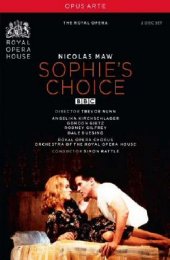
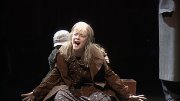
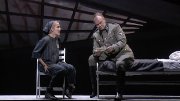
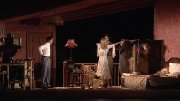
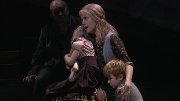
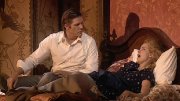
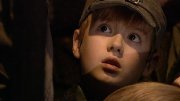
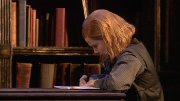
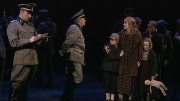
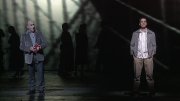







































Your Opinions and Comments
Be the first to post a comment!